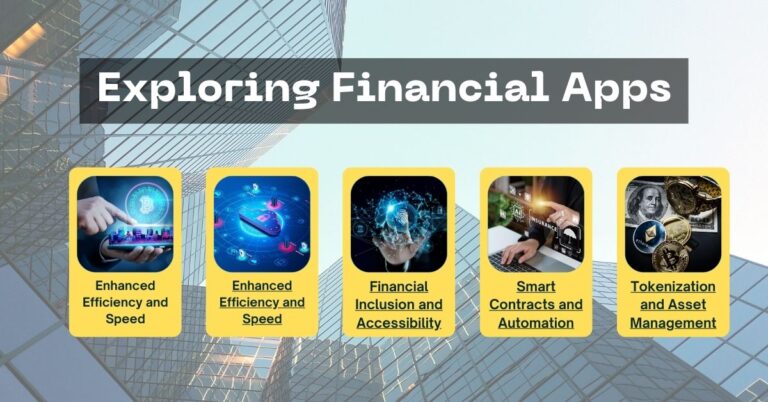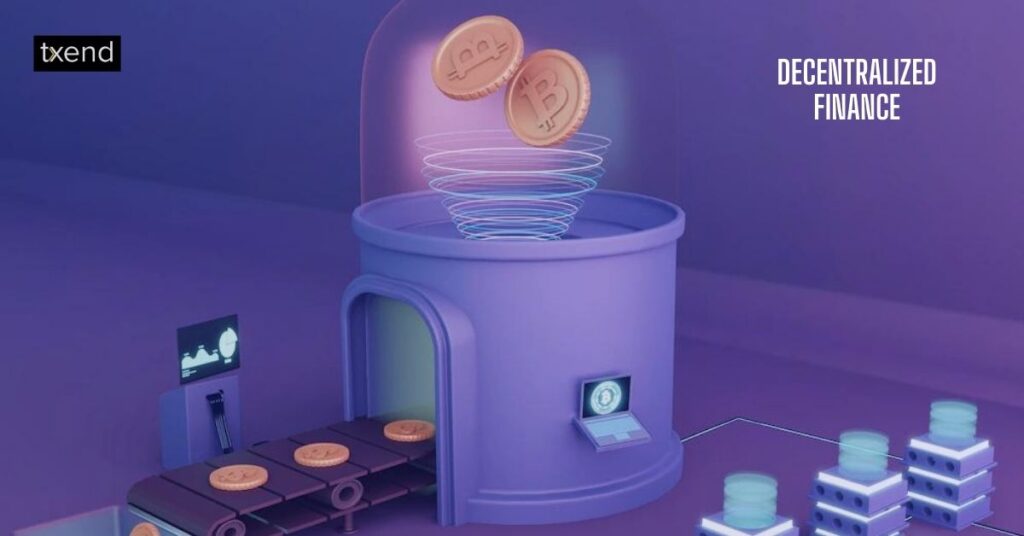
Blockchain in Fintech
Blockchain technology represents a groundbreaking digital ledger system that forms the foundation of developing financial applications, marking a transformative departure from conventional approaches in the realm of traditional financial services.
It operates as a decentralized and transparent ledger, recording transactions across multiple participants in a secure and immutable manner. Integrating blockchain in fintech can revolutionize financial services by enhancing transparency, security, and efficiency.
In essence, a blockchain is a chain of interconnected blocks, each containing a unique record of transactions.
Exploring Financial Apps

The rise of blockchain-powered financial applications redefines traditional financial processes, ushering in a new era of efficiency, security, and accessibility.
These innovative financial apps leverage blockchain technology to address long-standing challenges and deliver enhanced services to users across the globe.
Enhanced Efficiency and Speed:
Blockchain-powered financial apps are streamlining processes that were once cumbersome and time-consuming. These apps accelerate cross-border payments, remittances, and trade financing by eliminating intermediaries and enabling peer-to-peer transactions.
Transactions that used to take days can now occur within minutes, breaking down barriers and facilitating global financial interactions.
Security and Trust:
An essential benefit of blockchain technology lies in its intrinsic security characteristics. Financial apps built on blockchain offer transparent and tamper-proof transaction records.
Every transaction is cryptographically connected to the preceding one, forming an unchangeable chain guaranteeing data integrity. This heightened security instills trust among users, a crucial element in financial transactions.
Financial Inclusion and Accessibility:
Blockchain-powered financial apps are expanding financial inclusion by providing access to financial services for underserved or excluded individuals from traditional banking systems.
Users can access these apps with a smartphone and an internet connection, bypassing the need for a physical bank branch. This democratization of financial services empowers individuals to manage their funds, make payments, and even invest without the barriers of location or bureaucracy.
Smart Contracts and Automation:
Financial apps leveraging blockchain often incorporate intelligent contracts, self-executing agreements that automatically execute and enforce predefined terms when certain conditions are met.
This feature revolutionizes various economic processes, from loan disbursement to insurance claims settlement. Smart contracts eliminate manual intervention, reduce the risk of errors, and enhance process efficiency.
Tokenization and Asset Management:
Blockchain-powered apps introduce the concept of tokenization, converting real-world assets into digital tokens on the blockchain.
This tokenization opens up new possibilities for fractional ownership of assets like real estate, stocks, and commodities. Users can invest in fractions of high-value assets, unlocking liquidity and diversification opportunities.
In summary, blockchain-powered financial apps drive significant advancements in traditional financial processes. Their ability to enhance efficiency, security, accessibility, and automation reshapes the economic landscape.
While these applications advance, they can potentially revolutionize how individuals and enterprises engage with financial services, nurturing a more encompassing and interconnected global economy.
Key Concepts of Blockchain Technology Fintech
Blockchain technology, the driving force behind transformative changes in the fintech landscape, rests upon several critical concepts that define its revolutionary capabilities.
These foundational principles:
- Decentralization
- Immutability
- Consensus Mechanisms
form the bedrock upon which blockchain technology operates, revolutionizing financial services.
Decentralization:

At the core of blockchain’s innovation lies decentralization, a departure from the centralized control structures of traditional financial systems. In a decentralized network, there is no single point of authority or control.
Instead, data is distributed across a network of nodes, each contributing to the validation and verification of transactions. Decentralization ensures that no single entity holds excessive power, fostering trust and resilience in the network.
Immutability:
Immutability is a distinctive characteristic of blockchain technology, safeguarding recorded information’s enduring nature and authenticity. Once a transaction is added to the blockchain, it becomes memorable.
Each transaction is linked to the previous one through cryptographic hashing, forming an unbreakable data chain. This immutability safeguards against tampering and fraud, providing an auditable and transparent record of transactions.
Consensus Mechanisms:
These transactions are recorded within a decentralized network of computers referred to as nodes, guaranteeing that all participants within the network possess an identical replica of the ledger.
This decentralization eliminates the necessity for intermediaries, thereby decreasing the likelihood of fraud, inaccuracies, and delays.
Blockchain’s cryptographic techniques ensure that once a transaction is recorded, it cannot be altered retroactively, providing unprecedented data security and integrity. This feature is precious in financial services, where trust and accuracy are paramount.
The relevance of blockchain in revolutionizing financial services lies in its ability to transform traditional processes. It facilitates real-time, peer-to-peer transactions without intermediaries, streamlining cross-border payments, trade financing, and remittances.
Additionally, smart contracts, self-executing agreements embedded in the blockchain, automate and enforce contractual terms, reducing the need for manual interventions.
Blockchain technology also addresses identity verification and KYC (Know Your Customer) processes, enhancing customer onboarding while ensuring data privacy.
The potential for tokenization allows the representation of real-world assets like stocks, real estate, and commodities as digital tokens on the blockchain, enabling fractional ownership and liquidity.
Ultimately, blockchain’s relevance in fintech stems from its disruptive potential to redefine the financial landscape. As financial apps leverage blockchain’s features, such as immutability, transparency, and decentralization, the industry is poised for unprecedented innovation and efficiency gains.
From financial inclusion to secure data sharing, blockchain is a transformative force in reshaping financial services for the digital age.

Consensus mechanisms are the mechanisms through which a distributed network of nodes agrees on the validity of transactions. These mechanisms vary but share the goal of achieving agreement without relying on a central authority.
One well-known consensus mechanism is Proof of Work (PoW), which requires participants (miners) to solve complex mathematical puzzles to validate transactions.
Another approach is the Proof of Stake (PoS) method, where validators are selected according to the amount of cryptocurrency they possess. These approaches guarantee the inclusion of only legitimate transactions into the blockchain.
These critical concepts work synergistically to create a secure, transparent, and efficient framework for financial transactions. Decentralization eliminates single points of failure and control; immutability ensures data integrity, and consensus mechanisms foster agreement without intermediaries.
This combination of principles empowers blockchain technology to transform financial services, offering unprecedented security, transparency, and accessibility.
As blockchain matures, its impact on fintech will be defined by the unwavering application of these foundational concepts in reshaping the future of financial transactions and services.
Blockchain’s Impact on Fintech
Blockchain’s integration into the fintech landscape revolutionizes traditional financial services across multiple dimensions. Here, we delve into the profound impacts that blockchain technology brings to the forefront:
Revolutionizing Transactions:

Enhanced Security and Transparency:
Blockchain’s cryptographic security and decentralized nature enhance transaction security and transparency, reducing fraud and unauthorized access.
Cross-Border Payment Disruption:
Blockchain enables real-time cross-border payments by eliminating intermediaries, reducing costs, and expediting transactions, transforming global remittance.
Cryptocurrency’s Global Influence:
Cryptocurrencies, empowered by blockchain, are reshaping the financial ecosystem with borderless transactions, increased accessibility, and potential as a global store of value.
Smart Contracts & Automation:

Financial Agreements Redefined:
Smart contracts automate and self-execute agreements, eliminating intermediaries, reducing human error, and ensuring efficient compliance with predefined conditions.
Streamlined Process Automation:
Smart contracts automate complex financial processes, such as loan approvals and insurance claims, streamlining workflows and reducing administrative burdens.
Tokenization & Assets:
Real Assets Go Digital:
Tokenization converts real-world assets, like real estate and stocks, into digital tokens on the blockchain. This fractional ownership model democratizes access to valuable assets and increases liquidity.
Decentralized Finance (DeFi):
Empowering with DeFi:

Decentralized Finance (DeFi) platforms offer accessible, permissionless financial services, empowering individuals to borrow, lend, trade, and earn without intermediaries.
Yield Farming & Liquidity Pools:
DeFi introduces yield farming and liquidity pools, where users provide liquidity to earn rewards, revolutionizing traditional banking and investment models.
P2P Lending & Borrowing:
DeFi enables peer-to-peer lending and borrowing, fostering financial inclusion by connecting lenders and borrowers directly.
Impact on Traditional Banking:
Rethinking Banking:
Blockchain challenges traditional banking models by offering efficient, transparent, and customer-centric financial solutions, prompting banks to adapt or collaborate with fintech startups.
Collaboration & Competition:
Traditional banks collaborate with fintech to integrate blockchain solutions or face competition from agile fintech offering innovative blockchain-powered services.
Data Security & Privacy:
Data Integrity Boost:
Blockchain’s immutability ensures data integrity by preventing tampering and unauthorized changes, bolstering trust and reliability.
Balancing Security & Privacy:
Blockchain’s challenge lies in balancing security with data privacy regulations like GDPR, necessitating innovative approaches that uphold privacy rights.
Blockchain’s impact on financial services is multi-faceted, from secure and transparent transactions to reimagining financial agreements, assets, and even the very essence of banking.
While embracing the transformative potential, navigating the regulatory landscape and balancing innovation and compliance remain paramount.
Regulatory Challenges & Opportunities
Integrating blockchain into financial services presents a landscape rich with regulatory challenges and opportunities. While the fintech sector adopts the possibilities presented by blockchain.
It must maneuver through an intricate regulatory landscape to ensure the implementation of innovation with a sense of responsibility.
Here, we delve into the multifaceted aspects of regulatory dynamics shaping this transformative journey:
Navigating Regulatory Complexity:
Blockchain’s decentralized nature challenges conventional regulatory frameworks. Finding an equilibrium between encouraging innovation and safeguarding consumer interests necessitates regulatory bodies to adjust and engage in collaborative efforts with stakeholders within the industry.
Global Jurisdictional Considerations:
Blockchain’s borderless nature demands harmonized international regulations. Bridging gaps in cross-border compliance is essential to prevent regulatory arbitrage and establish consistent standards.
Data Privacy and Sovereignty:
Blockchain’s transparency and immutability can conflict with data privacy regulations such as GDPR. Innovations that reconcile blockchain’s benefits with data protection requirements are essential to maintain user trust and comply with legal frameworks.
Know Your Customer and Anti-Money Laundering:
Fintech and blockchain solutions must adhere to AML (Anti-Money Laundering) and KYC (Know Your Customer) regulations to prevent misuse of the technology for illicit activities. Identifying and verifying participants while preserving the blockchain’s anonymity is a complex challenge.
Tokenized Assets and Securities Laws:
The tokenization of assets blurs the lines between traditional securities and digital tokens. Ensuring compliance with securities laws and offering investor protection while promoting innovation is a delicate balance.
Smart Contracts and Legal Enforceability:
Defining smart contracts’ legal status and enforceability under existing law requires regulatory clarity. Establishing the conditions under which these contracts hold legal weight is essential.
Regulatory Innovation: Collaboration and Sandboxes:
Regulatory sandboxes and collaboration between regulators and innovators promote responsible experimentation. These frameworks facilitate testing blockchain solutions within regulatory boundaries, fostering compliant innovation.
Balancing Innovation and Risk Management:
Regulations must balance encouraging innovation and mitigating risks. Facilitating sandboxes and pilot projects and providing regulatory clarity incentivize startups and established players to develop blockchain solutions that align with regulations.
Future-Proofing Regulations:
The dynamic nature of technology necessitates adaptable regulations. Proactive engagement between regulators, industry, and legal experts ensures regulations evolve with technological advancements.
Opportunities For Efficiency And Transparency:
Blockchain’s transparency can enhance regulatory oversight, reducing the need for manual audits. Smart contracts can automate compliance procedures, improving accuracy and reducing administrative burdens.
As the fintech industry embraces blockchain’s transformative potential, addressing regulatory challenges in collaboration with regulators, policymakers, and legal experts is paramount.
Regulatory frameworks that foster innovation while ensuring consumer protection will play a pivotal role in harnessing the true power of blockchain in reshaping the financial services landscape.
Scalability & Sustainability
As blockchain technology in Fintech gains prominence , addressing scalability and ensuring sustainability becomes a crucial focus. Here, we delve into the dual challenges of scalability and sustainability in the context of blockchain’s transformative role in financial services:
Addressing Scalability:
Network Congestion:
Blockchain networks face challenges when transaction volumes surge, resulting in network congestion and slower transaction processing times.
Scalability Solutions:
Various solutions, such as sharding and layer-two protocols, are being developed to increase the capacity and speed of blockchain networks.
Interoperability:
Ensuring seamless communication between different blockchains facilitates more efficient and scalable transactions.
Sustainable Blockchain:
Energy Consumption:
Some blockchain networks, particularly proof-of-work systems, consume significant energy, raising concerns about environmental impact.
Transition To Proof Of Stake:
Transitioning from energy-intensive proof-of-work to proof-of-stake consensus mechanisms can substantially reduce energy consumption.
Environmental Awareness:
Sustainable blockchain initiatives prioritize energy-efficient consensus mechanisms and support green technologies.
Navigating the intricate balance between scalability and sustainability is pivotal in unlocking blockchain’s potential for transforming financial services. The ongoing development of innovative solutions and conscious efforts towards sustainable practices will shape the future of blockchain adoption in the fintech landscape.
Global Adoption & Future Trends
The global adoption of blockchain technology is shaping the future of financial services, offering innovative solutions that transcend borders. Here, we explore the wide-reaching impact of blockchain and the trends that promise to shape its future:
Global Reach of Blockchain:
Borderless Transactions:
Blockchain’s decentralized architecture enables secure and transparent cross-border transactions without intermediaries.
Financial Inclusion:
Blockchain-powered financial apps extend banking services to unbanked and underbanked populations, fostering economic inclusion on a global scale.
Remittances and Cross-Border Payments:
Blockchain streamlines remittances, reducing costs and transaction times for international money transfers.
Future Innovations & Trends:
Decentralized Finance (DeFi) Expansion:
DeFi platforms are expected to expand further, offering various financial services, including lending, borrowing, and yield farming.
Central Bank Digital Currencies (CBDCs):
Governments are exploring the issuance of CBDCs to modernize payment systems, potentially redefining the monetary landscape.
Interoperability:
Solutions focusing on blockchain interoperability will bridge different networks, promoting seamless data exchange and enhancing scalability.
Tokenization of Assets:
The tokenization trend will continue transforming traditional assets, enabling fractional ownership and democratizing investment opportunities.
Integration with the Internet of Things (IoT):
Blockchain’s integration with IoT will enable secure and transparent data sharing, revolutionizing supply chains and logistics.
Blockchain’s global reach is unlocking new dimensions of financial inclusivity and accessibility. The industry’s future holds promising trends that will further leverage blockchain’s potential, ultimately reshaping financial services to be more efficient, secure, and inclusive globally.
Frequently Asked Questions
Blockchain transforms capital markets by introducing transparency, efficiency, and accessibility. It enables real-time settlement and reduces counterparty risk through intelligent contracts.
Tokenization of assets enhances liquidity, and decentralized exchanges facilitate peer-to-peer trading, democratizing access to investment opportunities.
Tokenization allows fractional ownership of high-value assets, making investments accessible to a broader audience. Smart contracts automate compliance and streamline fund distribution.
Smart contracts execute claims automatically when predefined conditions are met. Immutable records enhance trust between insurers and policyholders, simplifying verification and reducing disputes.
It reduces costs and enhances security through tamper-proof records. Cryptocurrencies facilitate instant transfers, eliminating delays associated with traditional systems.
Conclusion
The journey through the convergence of blockchain in fintech reveals a landscape brimming with innovation, disruption, and boundless potential. As we examine blockchain’s influence on reshaping financial services, a clear and persistent conclusion arises:
Blockchain, a decentralized and immutable technology, is not merely a buzzword but a catalyst for change. It’s revolutionizing financial services by underpinning transparency, security, and transaction efficiency while reshaping the foundations of banking, payments, and investments.
From enhanced security and transparency in transactions to tokenizing real-world assets, blockchain’s impacts are far-reaching.
The emergence of decentralized finance (DeFi) democratizes financial services, enabling anyone with an internet connection to borrow, lend, trade, and invest. Cross-border payments are being reinvented, reducing costs and enabling real-time transfers, thereby fostering financial inclusivity on a global scale.
However, this journey is challenging. Regulatory frameworks are evolving to harmonize blockchain’s potential with consumer protection and compliance. Scalability and sustainability remain focal points, demanding innovative solutions that balance efficiency with environmental responsibility.
In the future, the trends encompassing tokenization, interoperability, and the merging of blockchain with emerging technologies such as IoT and AI hold the potential to redefine the landscape of financial services further. Central bank digital currencies (CBDCs) are poised to redefine monetary systems and how we transact.
In closing, the transformation brought forth by blockchain technology within fintech is seismic. It underscores the synergy between technology and finance and the potential to create a more inclusive, secure, and efficient financial world.
As blockchain’s journey continues, its impact on the future of financial services will be shaped not just by innovation but by the collective efforts of innovators, regulators, and consumers to harness its potential responsibly and ethically.
The power of blockchain has been unleashed, and its influence on the financial services landscape is poised to shape how we conduct transactions, manage assets, and access financial services for generations to come.
How Txend Can Help?

Txend plays a pivotal role in harnessing the power of blockchain to revolutionize financial services. With its innovative solutions, Txend addresses critical challenges in the industry.
It enhances security and transparency by utilizing blockchain’s decentralized architecture, ensuring tamper-proof records that boost trust in financial transactions.
Txend streamlines cross-border payments, leveraging blockchain’s borderless nature for real-time transfers, reducing costs and transaction times. Automated smart contracts facilitate seamless financial agreements, eliminating delays and manual intervention.
Moreover, Txend’s tokenization of assets democratizes investments, while its participation in the DeFi movement empowers users with decentralized lending, borrowing, and yield farming.
These collective contributions establish Txend as a driving force in reshaping financial services through the power of blockchain.

if you work as freelancer if any buyer message you on fiverr, upwork, freelancer or anywhere Quick Alert for Freelancers and Entrepreneurs Software will instantly notified you by Phone call.